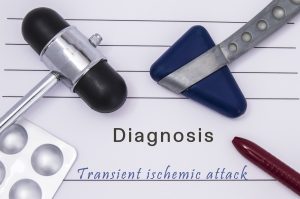 A transient ischemic attack (TIA), often incorrectly called a ministroke, occurs when there is a temporary blockage of blood supply to the brain. Unlike a full-blown stroke, a TIA resolves within a few minutes or 24 hours and does not cause permanent damage to the brain.
A transient ischemic attack (TIA), often incorrectly called a ministroke, occurs when there is a temporary blockage of blood supply to the brain. Unlike a full-blown stroke, a TIA resolves within a few minutes or 24 hours and does not cause permanent damage to the brain.
A transient ischemic attack may only last temporarily; however, it should be treated as an emergency, and medical attention should be sought immediately if you are experiencing the following symptoms:
- Slurred speech
- Blurred or double vision
- Dizziness or vertigo
- Nausea and vomiting
- Weakness, numbness, or paralysis on one side of the body
- Severe headache
- Confusion
- Loss of balance or coordination
The effects of a TIA, though temporary, are serious and often increase the risk of having a true stroke in the future. It is estimated that 1 in 3 people who experienced a TIA will eventually have a stroke.
Some people are more at risk than others for having a transient ischemic attack and potential stroke. Risk factors include:
- Having high blood pressure
- Having diabetes
- Having high cholesterol
- Having a family history of TIA or stroke
- Having atrial fibrillation
- Smoking
- Obesity
- Age (The risk increases with age for those 55 and older)
The risk of a TIA may be reduced by properly managing conditions and diseases such as diabetes, cholesterol, and high blood pressure through eating a healthy diet, adhering to medications, and routine doctor visits. Other lifestyle changes include quitting smoking and exercising.
A transient ischemic attack is diagnosed after an evaluation of your symptoms. Your healthcare team may perform a series of physical examinations and imaging tests to determine the cause of the TIA. Treatment may consist of medications, angioplasty, or surgery, and is more effective the sooner you receive medical attention.
Flushing Hospital has been awarded Primary Stroke Center Certification from The Joint Commission. This achievement reflects our commitment to providing stroke patients with the highest quality of care. To schedule an appointment at our hospital, please call 718-670-5486.
All content of this newsletter is intended for general information purposes only and is not intended or implied to be a substitute for professional medical advice, diagnosis or treatment. Please consult a medical professional before adopting any of the suggestions on this page. You must never disregard professional medical advice or delay seeking medical treatment based upon any content of this newsletter. PROMPTLY CONSULT YOUR PHYSICIAN OR CALL 911 IF YOU BELIEVE YOU HAVE A MEDICAL EMERGENCY.
